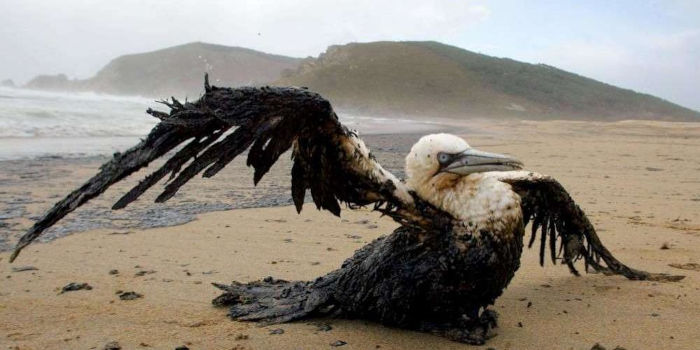“Everything is allowed, God does not exist. We are masters and possessors of Nature!” So can be held the biggest celebration in the history of mankind, with the planet as a buffet. This is called modernity, the world we live in. Tendentious, biased vision … like this drawing?
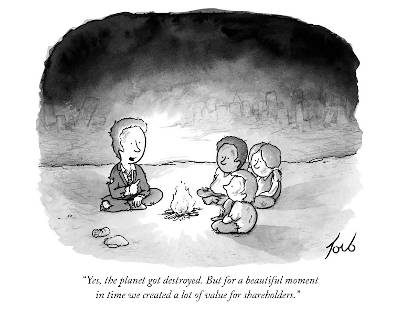
What world do we live in, for what is left of it? How did we get there? And does it serve any purpose to wonder about that? The disaster is not very difficult to contemplate. Just go to the beach. The best question is certainly: “what can be done?”, and take action. Quickly.
It seems to me, however, that it is never useless to be wonder about history. It allows us to understand our present, to realize how we are carried by a bottom strip that has brought us straight into this cliff for a long time. Humanity is not a blind meteorite which strikes a planet in an infinite night and destroys by its impact most of its living species. We belong to this world. Don’t we have anything better to do in this world, to this world? Shouldn’t we? All in all, aren’t we supposed to do anything important, meaningful, we who attach so much price, meaning, to our freedom? Freedom which is the expression of our self awareness, placing us apart from nature and animals. Freedom that endows us with such intelligence, such inventiveness that we will find the ways to survive outside Earth when we will have exhausted it. When it will be time to throw it away as trash. There is no one to judge us in this cold and indifferent universe.
How did we get there? And above all, is it fair? Can we be sure that we are better than anything we destroy by consuming it, or rather that it is only through us that things can have value and meaning in a blind universe that crushes us?
The roots of modern age
It may not have always been like that. We are technicians, makers of devices. We transform natural data, so the words “technological civilization” are a kind of pleonasm. But there were cultures, civilizations, for which the following vision was not dreamlike, fantastic or nostalgic, when even a simple bee is today in danger:
All the air was full of freshness, All the earth was bright and joyous, And before him, through the sunshine, Westward toward the neighboring forest Passed in golden swarms the Ahmo, Passed the bees, the honey-makers, Burning, singing in the sunshine. Bright above him shone the heavens, Level spread the lake before him; From its bosom leaped the sturgeon, Sparkling, flashing in the sunshine; On its margin the great forest Stood reflected in the water, Every tree-top had its shadow, Motionless beneath the water. The song of Hiawatha
Did it all started with the “Greek miracle”, and was Hiroshima foreseen in the poem of Parmenides? It’s not too much a caricature of what Heidegger said. But Eleusis has not always been the biggest oil refinery in Greece!
Is there any point in looking for those responsible? Perhaps, in order to see things more clearly, to understand when everything changed. The person of René Descartes stands out for sure in the affirmation of technical mastery of a world which simply becomes the raw material for the power of mankind: “Masters and possessors of Nature” (Discourse on the Method, 1637) . Depersonalized, Nature can thus become “a set of necessary laws” (Kant), meaning the simple reservoir of our power. Kant also makes very clear that finality does not belong to the categories of human understanding : finality has no place in the foundations of the scientific world view. He does not advocate it, he notes it, and the idea is not new: Spinoza exposes it very clearly in the Ethics, including in the very simple and very clear Appendix to Book I. Assigning any purpose to the nature, to the natural being in its constitution, its origins, means anthropomorphism. That is to say an illusion with strong religious significance of which we have been prisoners for so long. Nothing has a raison d’être, nothing in itself has any utility, nothing exists for any reason. And from the moment we stop wondering what it is made for (and revere the One who did it), we can understand how it works. And thereby increase our power by using it for the purposes we are the only ones to set.
This is called modernity.
There is no longer any meaning outside of what man builds. Which means that God is dead: Nietzsche becomes possible, we can see today how his thought was foreshadowed by the birth of the modern scientific mind, if we have been modern for roughly 400 years.
Does it take 400 years to melt Antarctica? To kill the last tiger, the last bee? So that the world of Brueghel the Elder no longer exists but in video games, because there will soon be no more snow or even Siberia:
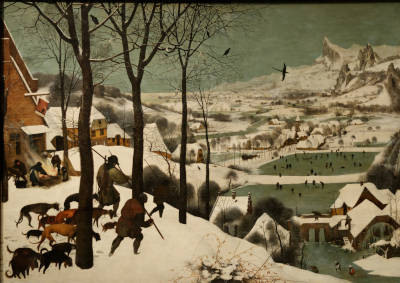
What is at stake, perhaps the key to everything, is this link between the lack of meaning of things in themselves and the legitimacy that we base on reducing everything to our usefulness. Nothing makes sense apart from what man sets, Kant is perfectly clear and lucid, expressing this idea with harshness:
“The fourth and last step which reason took, thereby raising man completely above animal society, was his realisation that he is the true end of nature. When he first said to the sheep, “the pelt which you wear was given to you by nature not for your own use, but for mine” and took it from the sheep to wear it himself, he became aware of a prerogative which, by his nature, he enjoyed over all the animals; and he now no longer regarded them as fellow creatures, but as means and instruments to be used at will for the attainment of whatever ends he pleased. This implies an awareness of the following distinction: man should not address other human beings in the same way as animals, but should regard them as having an equal share in the gifts of nature.”
(Kant, Conjectural Beginning of Human History)
It is striking to see how Kant plays here with the idea of finality, of nature’s meaning (which strictly nothing comes to validate), to deduce very clearly that if man is the end of nature, then it implies rights which benefit other men, and not nature itself! Of course, Kant does not ask himself: “Is it of any importance that I treat my environment like a garbage can? ” He could also ask himself: “Does it matter if the sheep suffers or not when I remove its skin? Or if I exterminate all the beavers of this area to dress the women with their fur? ” But this question does not matter: only man has rights because only he is an end in himself, in particular as he is the only being who consciously poses ends with his reason. There lies its nobility. The reign of ends. Like dressing women well. This makes them desirable.
Of course Kant does not care about this, his concern is morality. The problem here, however, is not what Kant thinks, but what were the consequences of the principles he helped founding. They have been active for quite a long time.
Let’s quickly notice that animal suffering doesn’t really matter in the foundations of modernity: Descartes takes up explicitly an idea of Gomez Pereira, according to which animals are pure machines devoid of feelings (in addition to thought). If Descartes had owned a cat, maybe could it only have been changing a detail of his ideas and not history…
But we have arrived at the turning point, the one that founds and legitimizes everything: only man sets ends as long as he has a conscience, and that gives him rights. Nature as a person with purposes, giving us our place and assigning us a role in its balance, that does not exist. So, nothing has a purpose in itself, there is no right, no meaning and no end except for humanity. This makes all its nobility and legitimizes all its action, especially its appropriation of nature.
What is this idea worth?
The problem is that it is true, at least it fits to everything we know about nature: it is not organized by any consciousness, there is no finality at work in the constitution of the living, neither in its detail nor in the totality, even if we admire it, for example in the song of Hiawatha above. Here is an inseparable link between epistemology and axiology. What validates such an idea are the technical applications that we build, based on physics. If it were not true, how can we explain the world we have behind us which is, every day more, applied science, whether it is physics or, more and more, biology? We understand the living, and if it is today more and more organized according to an end, it is the one we have set.

To be modern, to do what?
What are human ends worth? Basically, all that, for what? Two answers put into perspective the value of what we call modernity.
The first of these answers is the massive adhesion, the behavior of a real herd, the adulation that men can experience in front of various kinds of performance. Here is an example of what we can build, achieve, for the greatest pleasure of an immense number of beings aware of themselves, lucid, endowed with reason and capable of distinguishing good from evil, people who will find meaning in this activity that can be a justification for their existence, especially after a week of hard work dedicated to the noble cause of contributing to the progress of the species.

Will you wonder where the nobility of the human being resides? (beyond the environmental cost of such leisure, but who cares?) Or just, simply, nobility? Choose between two dominant males, which is better than the other, by its nobility, its beauty, its greatness, the admiration he is worthy of? There is anthropomorphism here, but do you hesitate, only for a second? Maybe then can we start questioning together the value of this capacity that man has to set ends.
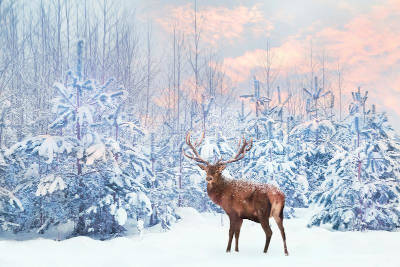
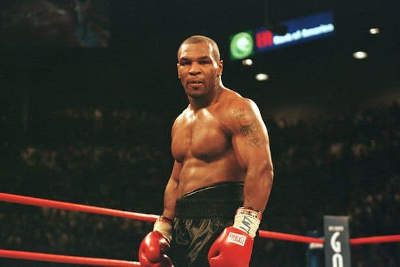
Let’s ask the question differently: what assures us that the deer above does not have the right to live, that its antlers are only there to decorate a chimney because man decided so, and that the concept of right is purely human? What can justify such an attitude? What are the ends that man gives himself worth, is it possible to make an assessment? All this, for what?
Play soccer, let off steam before a boxing match, taking pleasure in massing, being a herd. Including staying at home in front of his television to consume alcohol or another psychotropic drug, everyone thinking the same thing at the same time and being proud to participate in the same “contemplative” passivity precisely as it is massive: 2 billion viewers! Does this justify destroying our environment? It is true that we need a lot of space, to feed us, to house us, to distract us. At what price ? Is it worth it?
We can develop at length what human activities consist of, in all their horror: massive, undifferentiated fishing, limitless deforestation to produce palm oil, or whatever, the list goes on and on. Daily. In indifference to living species that disappear without any awareness of the fate we inflict on them, sometimes with pride.
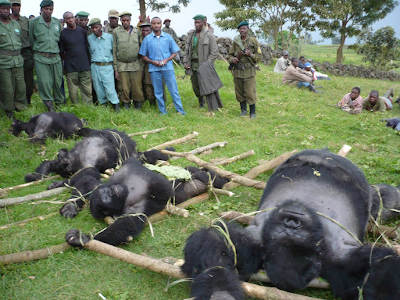
Who deserves what?
Ultimately, are men doing all of this for a purpose other than reproducing themselves, the second answer we were talking about, beyond being entertained? But then, are they doing anything different from what other living species do as they also seek to perpetuate themselves? We will answer that we put in it a symbolic dimension, a meaning, a conscience. It is always the same problem: in the end, what does that change, the sense of family? Does destroying our environment make us superior to it as it is only for us that these notions of value exist? What world do we give to our children?
In a masterful work, The Sheep Look Up (1972), John Brunner shows how connected are the destruction of our environment and our own self-destruction, how by destroying nature we destroy ourselves.
The whole novel depicts this herd logic, so well illustrated by this small panel: “To keep the pier clean, throw your waste in the water” (first page of the novel). Thus, there is a constructive activity to get involved in, in such a dying world: picking up the trash. Brunner states this very clearly: this is what we will let our children do. This justifies our industrial and technological development, giving meaning to our existence.
The novel begins by staging a confined humanity, often only able to go out wearing masks because of an air that his own industrial activity have turned unbreathable. The main character starts his day by driving his child to a specialized medical center taking care of his disability, like so many of his fellows. He has enough money to finance these cares, as well as his life in a secure residence, with armed guards to protect his family against extreme social violence reflecting a society in total decomposition. Many scenes show this logic of herd which does not exempt us from our individual responsibility, does not provide us with any excuse, but explains pathetic catastrophes. Like this winter sports station which has to move higher and higher because of the melting snow, still frequented by lot of tourists, who all perish when it is swept away when the bang of a supersonic airplane triggers an avalanche…
The novel begins as follows:
The day shall dawn when never child but may Go forth upon the sward secure to play. No cruel wolves shall trespass in their nooks, Their lore of lions shall come from picture-books. No aging tree a falling branch shall shed To strike an unsuspecting infant's head. From forests shall be tidy copses born And every desert shall become a lawn. Lisping their stories with competing zest, One shall declare, "I come from out the West, Where Grandpa toiled the fearful sea to take And pen it tamely to a harmless lake!" Another shall reply, "My home's the East, Where, Mama says, dwelt once a savage beast Whose fangs he oft would bare in horrid rage-Indeed, I've seen one, safely in a cage!" Likewise the North, where once was only snow, The rule of halls and cottages shall know, The lovely music of a baby's laugh, The road, the railway and the telegraph, And eke the South; the oceans round the Pole Shall be domestic. What a noble goal! Such dreams unfailingly the brain inspire And to exploring Englishmen do fire… "Christmas in the New Rome," 1862
Scary?
The science fiction we have just used gives us many other metaphors for the present that send us back to ourselves in an unflattering way. Another striking image takes us back to who we are: the replicators of the Stargate series. These beings have no other end than to reproduce themselves, colonizing everything according to the standards of their species and their limitless proliferation. These beings are the worst enemies of all that is not themselves. Isn’t that a good image of who we are, when we’re already thinking of terraforming Mars when we’ll have exhausted Earth? There is no shortage of humans who are already well aware that we will have to leave one day. As there are already options taken on thawing Greenland.
In his Vortex novel, Robert Charles Wilson gives us a scary picture of what we can do, what we will do with our environment anyway because no one will stop us: if we were given a second planet filled with hydrocarbons, we would import them to fuel our cars when all the oil on Earth would be exhausted! Is it so unrealistic? On the contrary, it is a striking metaphor for what humanity is indeed capable of. This has been foreshadowed for so long in our civilization’s project. Robert Charles Wilson presents the result as the death of the Earth. For our comfort.
We are the only ones to set ends and can therefore only be judged by ourselves. These ends that we pose are to be assessed in their moral value regarding to what is worth something, namely the reasonable being himself, to speak like Kant once again. So let’s look at the result, two centuries after him… And let us therefore ask the inconvenient question, perhaps: are we worth it? Looking at the results, is there anything that can justify our “civilizing” endeavour? Of course what we have done was not only survive. We would have been able to give ourselves the means of a survival that turned our planet into a paradise, or at least preserve it. As long as our world was admirable.*
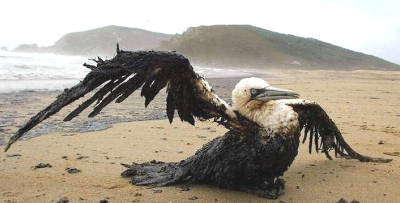
The ship was called America Grande…
Space and time of the guardians of the world
Robert Charles Wilson, again, builds a novel around this idea of visitors from another world who watch our show and estimate the results of what we have done with our planet (The Harvest). It is not what he stages, but under the eyes of other beings endowed with reason and more wisdom than us, do we have anything to be proud of? Have we shown ourselves worthy of being the old Kant’s ends in ourselves? In other words, looking at the result, how to establish mankind as a moral value? How to believe in humanism?
Perhaps two dimensions could spark a little gleam, make us think that everything is not so black: art and science, in the frames of space and time.
Let’s say it again: how is it possible to sit at the heart our world’s splendor and wonder what we are going to do with it? A real estate project? Bury nuclear waste? Look for gold? Are we just that?
We are able to perceive that the Earth is splendid, which proves the conformity of our nature with Nature. The history of the arts gives us so many examples, starting with Pharaoh’s Egypt which conceives itself as a continuity of its natural environment. But, much closer to us, all the imaginary constructions which place man in Nature, as transformed as it is, show that our sensitivity is always there, that it is not possible to root out in everyone the sensitivity to the universe we are from. What does the immense success and especially the immense influence of Tolkien’s work mean? We are not Elves, the guardians of the forest. Far from it. Their departure for a great elsewhere has a deep meaning, as the industrial project undertaken by Saroumane, which cuts its trees while he collaborates with Sauron. There are so many examples of such metaphors in so many current artistic forms of expression, including universes of video games. It is particularly pitiful to witness a virtual confinement in a universe which owes all its forms and structures to what is there, outside, still almost at hand, if there remains a forest, a river, a mountain that has not be turned into an industrial touristic complex ready to consume.
We could make our planet a Paradise again because we are always artists, and what we call “beauty” comes in the first place from all our environment which teaches us what beauty means.
The sanctuarization of large parts of “our” space would be an excellent idea, it is simple to see how much biodiversity would immediately benefit from it. We also see how quickly living species return to occupy the spaces that man deserted, for example at Chernobyl… It is up to us to establish the survival of living species that we destroy as an end in themselves. Our own nobility would reside precisely in the fact of establishing as an absolute moral value that each living species has the right to live and to occupy a space which allows it to live in peace, meaning without man. On this condition could we transform our planet into a paradise, or rather restore it.
We have the means to do so. as we can be the gardeners, the artists of the world we are responsible for as a legacy. The goals of reason have no way to conflict with the principle of establishing nature as an end in itself. Only this way can we prove that we are really worth something, by ceasing to try to respect only our species. Well, just that, showing ourselves respect, is already giving us a hard time, let’s just think about the history of slavery…
Our scientific knowledge give us the means to act on a very large scale: yet, it proves that there is no finality apart from that which we establish. At the same time we know that we are the continuity a process that has lasted for 4 billion years, with considerable cataclysms, and did wear on, anyway. Only for us does that this immensity of time makes sense, but is such a meaning purely subjective, contingent, relative? Does duration give a value, something that matters?
Can I tell the last representative of a living species, in front of me in his cage, that he was there only for me and therefore had no rights? Even if I can’t tell him anything because he can’t understand it, his species was worth no less than mine. I am guilty of his extinction, there is a fault because I have not given myself the means of his survival, showing respect to what was given to me as a legacy.
Let us go for a little while to a certain anthropomorphism. My ancestors, those from which I come from, passed on to me a precious legacy, and all I do is leaving these ancestors, like my grandmother who holds out her treasure to me, in the midst of my excrement, treating her with violence, to go squandering her heritage as quickly as possible. Because I do not have to consider that there are ancestors or inheritance. I am the only one who can think such a thing. This behaviour does not come under what should rigorously be called civilized. It is even perfectly despicable. This is the face of civilized man.
May time, the billions of years to build the balance of life, be the foundation of right? Or does a man have the legitimacy to break everything, without even asking himself the slightest question, simply because he understands how to do it? Our survival is at stake, we understand it every day more. But as a principle, we can legitimately state that we are in possession and in charge of a legacy, that of the time of life. Kant postulated the existence of an unknowable God as a condition for the meaning of our actions. It may not be a complete nonsense to think ourselves as as heirs of Nature, as we are from our planet! Here is a clear answer to the question: what are we doing here?
We are guardians, we who are coming at the end of an evolution of which we can be the crowning and not the gravediggers. The very meaning of our existence is to magnify, or at least to preserve what we are responsible for. Here is a moral significance which transcends cultural diversity: respect for ancestors – even if they are not endowed with conscience, it is precisely this conscience as we are the last stage of the process which gives us the duty to do so. We did not wake up on Earth to have no duty to her who made us, even if she did not realize it, even if I cannot say “Her” properly speaking. Is it so meaningless to consider ourselves precisely as Earth’s consciousness, the one we cannot find on our planet apart from us? It is not very difficult to rejoin the Gaia hypothesis.
We are not an accident like the meteorite that killed the dinosaurs, nor are we the end of a great design made by a Creator who does not exist. But we have to consider ourselves as heirs, in a situation of transmission, of inheritance for which we are responsible for. There lies our dignity. This way can we be worth something to our own eyes, far beyond human rights.
Humanism has lived. Just get out of our concrete jungles in which we have trapped ourselves, go beyond these deleterious agro-industrial complexes which we still name coutryside, to understand where our duty is, what is the only source for our dignity. This will certainly involve the abolition of certain freedoms, and punishments which demand exemplarity. What does poachers of protected species deserve, as those who fund them? What would be unfair? Perhaps, in the long term, will we regain democracy when we will have done what we have to. Time is running out.

